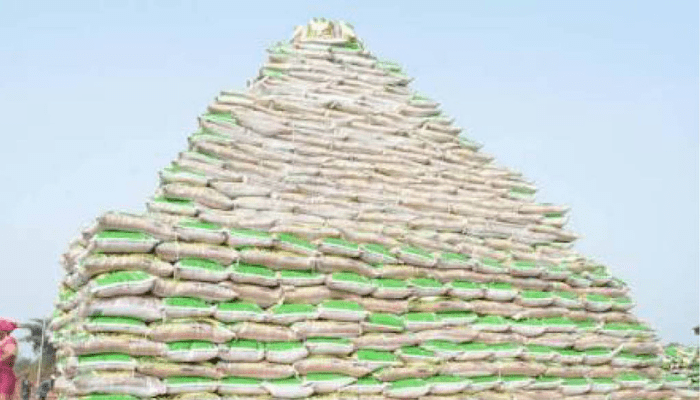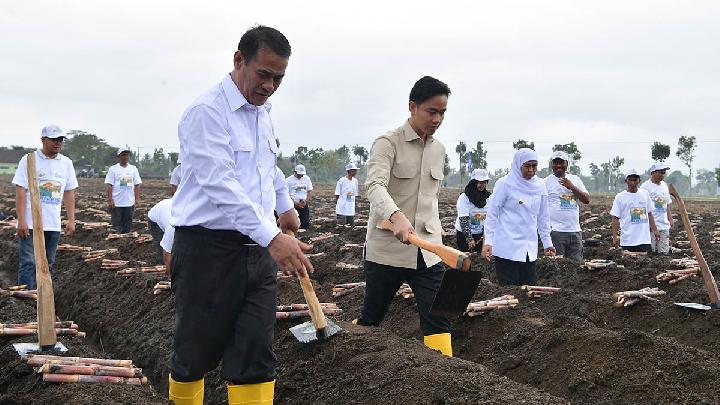Tags
Soaring prices raise questions about Buhari’s rice pyramids

The rising price of rice, a staple food for many Nigerian households, has left many with questions about the Anchor Borrowers’ Programme (ABP) that led to the unveiling of rice pyramids during the administration of President Muhammadu Buhari.
BusinessDay findings showed that the price of locally produced rice has doubled to at least N60,000 per 50kg bag from an average price of about N30,000 in 2022.
During the unveiling of 13 rice pyramids made up of 1.2 million bags, Buhari had assured that the rice revolution being championed by his administration under the ABP of the Central Bank of Nigeria (CBN) would deliver food sufficiency across the country.
Farmers blame paddy scarcity, high transport cost
Abraham Ogebe, chief operations officer at Abadini Group, producers of Abadini rice, said the government needs to invest more in rice farms rather than rice mills in order to tackle the challenge of availability and affordability.
He attributed the increase in price of rice to scarcity of rice paddy, which he said was a major challenge to rice production in Nigeria, followed by high cost of transportation and diesel prices.
“The major problem affecting rice production in Nigeria is the scarcity and high price of paddy. Of course the unveiling of the rice pyramids pushed a lot of people into rice production but many were disappointed because it didn’t go as expected,” he told BusinessDay.
“The paddies are produced locally by farmers. The government should focus investments in rice farms; we have heard of their investments in rice mills but what we really need is investments in rice farms so as to improve the availability of paddy for millers. If there are no paddies, the rice mills that are being established will not be in use,” he said.
In 2015, Buhari’s administration identified and launched the ABP as an essential policy instrument for achieving economic diversification through agriculture.
The ABP was designed to encourage investments in agriculture and empower smallholder farmers as drivers of transformation in the agricultural sector and as critical enablers of economic growth.
Chiderra Nnabuife, an agricultural expert, blamed the high cost of rice on the exchange rate and the impact of fuel subsidy removal.
He said: “We all know that the rice pyramid was a jamboree and would not be able to achieve as much as the government said it would, especially reducing the cost of rice, because it was not properly administered. Many of the beneficiaries of that programme are not farmers, and that is the reason it has not been fully recovered.
“However, we must recognise that the high cost of petrol due to the removal of fuel subsidy and the forex has impacted the prices of commodities in the market. For example, prices of fertiliser, seedlings, labour and other factors of production are on the high side.”
Nnabuife highlighted the high cost of processing machines and the need for the government to consider import waivers on machines for food production.
He said the cost of transporting agricultural produce from a place to another has greatly increased, impacting the market price.
“Before a trailer of rice moves from the North to the East, they must have paid a huge amount of money to settle security personnel on the road, the cost of transporting those items is also high and insecurity is also a factor,” he said.
Meanwhile, Nigeria is projected to become the world’s largest importer of rice in 2024.
A United States Development Agriculture report showed that the value of rice imports for 2023/2024 into Nigeria is expected to surpass the entire N1.08 trillion spent under the ABP.
According to the report, Nigeria is expected to import at least 2.1 million metric tonnes (MT) of rice in 2024, as stronger demand for imported rice is expected due to both high prices for local rice and quality concerns.
The consumption of rice has been on a steady rise, reaching over 7 million MT and exceeding the production capacity of indigenous producers at 5.4 million metric tonnes.
This, according to the AFEX 2023 Wet Season Crop Production Report, has led to a supply gap of 2 million MT as well as over 37 per cent increase in the price of the commodity in 2023.
Uchenna Daniel of the Green Grain Nigeria Company pointed out that the ABP was implemented by the government to support rice farmers and increase local rice production.
He said: “The Anchor Borrowers Programme aimed to provide smallholder farmers with access to financial support, improved inputs, and technical assistance to boost their productivity. The programme was expected to increase local rice production, decrease reliance on imports, and ultimately lead to a reduction in prices of rice for consumers.
“However, despite the efforts and investments made through the program, the price of rice in Nigeria has remained high. Several factors contribute to this failure. For example, Nigeria faces challenges in terms of infrastructure, including inadequate irrigation systems, poor road networks, and limited storage facilities.
“These problems hinder the efficient production and distribution of rice, which affects its price. There are also issues of insufficient funds and implementation challenges.”
The ABP scheme was aimed at providing farmers with the critical funds and inputs needed to increase local production.
As of 2022, at least 4.8 million farmers had benefitted from the programme, according to the CBN.
According to the central bank, the ABP had supported about 4.57 million smallholder farmers who cultivated over 6.02 million hectares of 21 commodities across the country as of February 2023.
The International Monetary Fund (IMF), in a March 2023 report, noted that 76 percent of the loans collected by beneficiaries were yet to be repaid.
It said agricultural credit in the country had not significantly succeeded in increasing production due to the difficulty in reaching the targeted farmers.
It said that although the CBN allowed farmers to pay in cash or give produce of the same value under the ABP, repayments had been very low.
“For the Anchor Borrowing Program, repayment is also low at 24 percent, especially since repayment can be made in kind, thereby limiting the tenor of the loans to one year,” the IMF said. “Part of the problem is that the incentive structure for repayment is weak, the recipients of the loans are not always well targeted and occasionally the funding is diverted for other things different from the original purpose.”
https://businessday.ng/news/article/soaring-prices-raise-questions-about-buharis-rice-pyramids/Published Date: January 9, 2024






